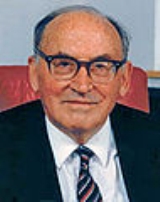
(26 June 1913 – 29 November 2010) was a British
computer scientist
credited with several important developments in computing
. At the time of his death, Wilkes was an Emeritus Professor of the University of Cambridge. He received a number of distinctions: he was a knight bachelor, Distinguished Fellow of the British Computer Society
, a Fellow of the Royal Academy of Engineering and a Fellow of the Royal Society.
Wilkes was born in Dudley
, Worcestershire
, England
and grew up in Stourbridge
, West Midlands
, England
, where his father worked on the estate of the Earl of Dudley
.
A source of strength in the early days was that groups in various parts of the world were prepared to construct experimental computers without necessarily intending them to be the prototype for serial production. As a result, there became available a body of knowledge about what would work and what would not work.![]()
In the judgment of design engineers, the ordinary means of communicating with a computer are entirely inadequate. [...] Graphical communication in some form or other is of vital importance in engineering as that subject is now conducted; we must either provide the capability in our computer systems, or take on the impossible task of training up a future race of engineers conditioned to think in a different way.![]()
The artificial intelligence approach may not be altogether the right one to make to the problem of designing automatic assembly devices. Animals and machines are constructed from entirely different materials and on quite different principles. When engineers have tried to draw inspiration from a study of the way animals work they have usually been misled; the history of early attempts to construct flying machines with flapping wings illustrates this very clearly.![]()
Surveying the shifts of interest among computer scientists and the ever-expanding family of those who depend on computers for their work, one cannot help being struck by the power of the computer to bind together, in a genuine community of interest, people whose motivations differ widely.![]()

